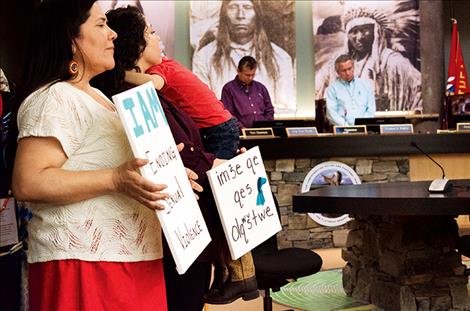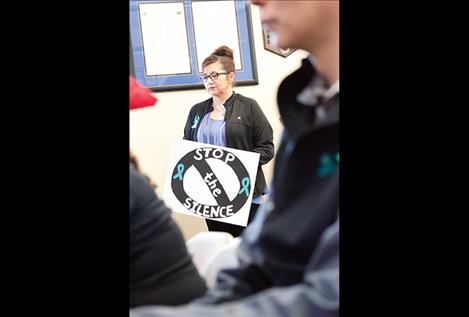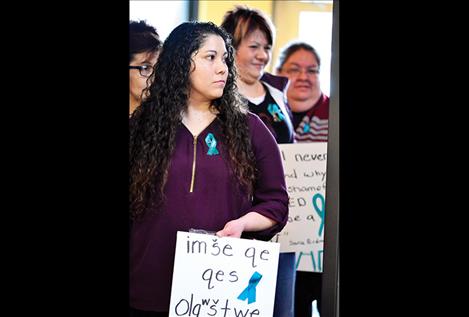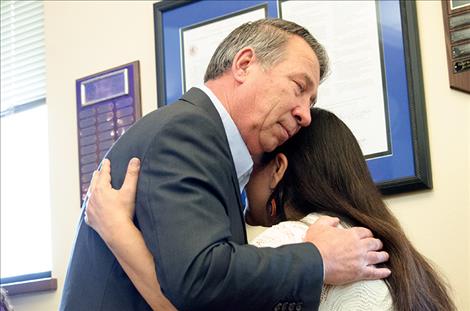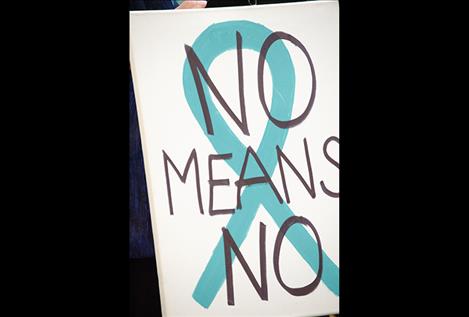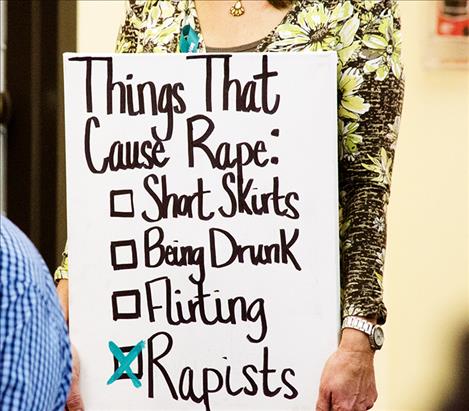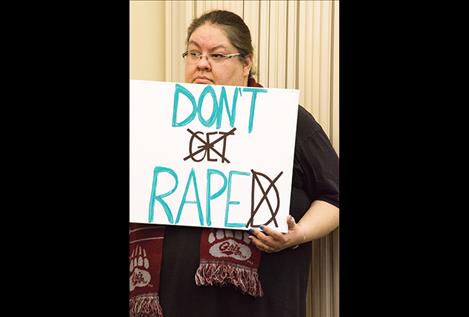Sexual assault survivors honored
Hey savvy news reader! Thanks for choosing local.
You are now reading
1 of 3 free articles.
PABLO – About a dozen women and men stood up to give survivors of sexual assault a voice during the Confederated Salish and Kootenai Tribal Council’s quarterly meeting on Friday.
The event coincides with the national Sexual Assault Awareness Month, which is held in April. It started in the 1970s as a protest against sexual assault and grew across the nation to support survivors, share resources, and prevent sexual assault, done primarily by refocusing the accountability on the individual who committed the sexual abuse, according to the National Sexual Violence Resource Center.
CSKT victim’s assistance groups organized a protest event, which is now an annual event, this is the second year, in an effort to bring awareness to the problem that is having a substantial impact on American Indian people.
“The average rate of rape and sexual assault among American Indians per year is 3.5 times higher than all other races,” the CSKT’s Victims Assistance Program states.
Tribal Council Chairman Vernon Finley thanked the group for bringing awareness to the issue. The council participated in the protest by reading statements provided by the group, including “one in three women” is affected by sexual abuse. Protestors started their hour of silence while the council read those statements.
The group stood in a half circle, holding signs with different messages while the council conducted the meeting. One sign said: “Rape is never the victim’s fault.” And another: “No means no.”
Tribal council members stood in a show of respect as the group later broke their silence. CSKT mental health provider Gena Montoya said the action of being quiet was symbolic of a survivor’s silence.
“We want to give them a voice so they can break their silence,” she said. “It is important for us to stand together as a community and support the victims of sexual assault.”
Survivors spoke during the event with support from friends, family, and the council members. Montoya commended a man in the audience for standing up and breaking his silence. He said men are affected, too.
“It’s powerful to have a man tell his story,” Montoya said. “Violence is never the victim’s fault and there should be no shame.”
Ruth Swaney stood up to say that the abuse must end. She isn’t sure exactly why the rate of sexual assault is high among Indian people but she credits a breakdown of cultural connections as a possibility.
“The loss of language is a direct connection to the loss of who we were as a people,” she said.
She believes disconnecting from culture created a downward spiral towards sexual assault, domestic violence, and substance abuse. “This is not traditional; this is not our way,” she said. But, things can change: “The capacity to recover is there.”
Swaney said she is proud of all survivors who have ever told their stories, but she would also like to see “recovered abusers” tell their stories.
The drum group “Buckshot” performed an honor song while the group holding the signs walked in a line from the room. The crowd stood to show respect.
CSKT Victim Assistance Program works with survivors.
“We create a space for survivors to feel like they are heard,” Advocate Trisha White said before the protest.
“Survivors often don’t speak out because they feel like nothing will be done or they will be blamed,” she said. “We want to inspire people to come forward and tell their stories, to empower them, so they can get their esteem back, and maybe help other women.”
A few guidelines can help the general public hear those stories in a way that will help survivors. “The first thing we need to do is to believe people without judgment,” she said.
The next step is to help people find resources. In Lake County and on the Flathead Indian Reservation, Program and Safe Harbor can provide survivors with an advocate to help them through the process of getting medical help, legal assistance, and emotional support.
“An advocate is right there to help with every step including the criminal case, if they want to go that way,” she said. “We can even help them get a rape kit done, and they don’t have to press charges right away. They can wait for up to a year if they need to.”
Montoya said getting help is part of the healing process.
“It’s about living life and not letting that assault define you because part of being raped is losing control,” she said.
Marlene Health is another advocate with the Victims Assistance Program. She stressed the importance of letting a survivor lead recovery efforts, especially in a small town where people often know everything that goes on. “It’s part of their empowerment to let them lead the way when they are ready,” she said.
The Victim Assistance Program can be reached at 675-2700 ext. 1186 or 877- 231-5173. The Safe Harbor hotline is available 24-hours a day at 406-676-0800.















